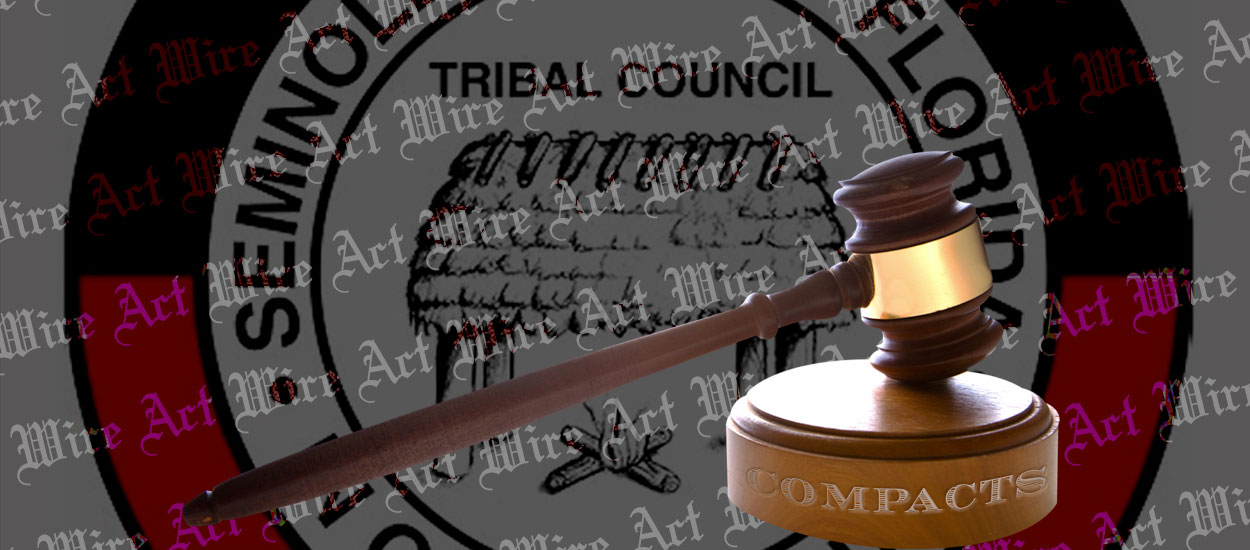New Tribal gaming compacts face legal hurdles
Approximately three months ago Florida Governor Ron DeSantis renewed a compact with the Seminole Tribe, which allowed them to offer expanded gambling, including online casino gambling and remote sports betting. The agreement guaranteed the state of Florida $2.5 billion in new revenue over the next five years and $6 billion through 2030.
The compact sets protections for horse racing and jai-alai and allows those two parimutuel entities to set up partnerships with the Seminoles to offer sports betting at the parimutuel venues. The compact is expected to create about 2,200 new jobs. Florida is one of many states reviewing their compacts with Native American tribes. Arizona and Washington state just renewed their compacts and allowed the tribes to offer sports betting on the reserves and various states amended or renewed their compacts in the last three years.![]() Not surprisingly, commercial casinos and other gambling interests are not enthusiastic about these agreements and have threatened to challenge the compacts in Federal court to get them nullified. In Florida, the owner of Miami Magic Casino (a commercial casino) and Bonita Springs Poker room have issued a formal complaint about the compact and are suing the state government in court. They say that the Indian Gaming Regulatory Act (IGRA) requires that all betting take place on Indian lands and this compact goes well beyond that purview.
Not surprisingly, commercial casinos and other gambling interests are not enthusiastic about these agreements and have threatened to challenge the compacts in Federal court to get them nullified. In Florida, the owner of Miami Magic Casino (a commercial casino) and Bonita Springs Poker room have issued a formal complaint about the compact and are suing the state government in court. They say that the Indian Gaming Regulatory Act (IGRA) requires that all betting take place on Indian lands and this compact goes well beyond that purview.
Under the terms of the compact, the Seminole Tribe would be able to take sports bets on the six reservations, which is not under dispute, but the partnership with the parimutuel operations is what Miami Magic and Bonita Springs believes to be illegal. They say that the rules of the IGRA mandate that all betting must take place on the reserve and the parimutuel sites are not on tribal land. The exact part of the IGRA that Miami Magic Casino and Bonita Springs Poker Room are referring to is in section 81 and says "(5) Indian tribes have the exclusive right to regulate gaming activity on Indian lands if the gaming activity is not specifically prohibited by Federal law and is conducted within a State which does not, as a matter of criminal law and public policy, prohibit such gaming activity."
It's also possible that the partnerships may violate another section of the IGRA, since the terms of the partnership say the parimutuel venues would get 60% of the profit and tribe would take the remaining 40%. But section 4(b)iii of the IGRA gaming ordinance mandates that no less 60 percent of revenue must be income to the tribe and 40% is obviously less than the required 60%.
Along with the IGRA, many analysts and commercial entities say the allowance for Tribes to offer online gambling (whether casino or sports betting) violates both the UIGEA and the Wire Act. The UIGEA requires all wagering to be intrastate, but the Federal government has recognized Tribal lands as being sovereign and not subject to the same rules as state lands. Consequently, if Tribes are going to offer online wagering, which would be accessed by Floridians not living on reservations, then they could very well be breaking federal law. U.S. courts have always maintained that Internet betting takes place at the site of where the bet is placed and not where it is received.
WTO ruling
As many will recall, that was the whole basis of the fight between the government of Antigua and the United States, which eventually had to be resolved by the WTO. The government of Antigua said that their remote betting law allowed gambling businesses in Antigua to take bets from anywhere in the world and was legal since the servers were located on Antiguan soil. But the U.S. government called that nonsense and said the gambling takes place where the bettor is located. In fact, Jay Cohen came back to the United States to fight the charges against his company by the U.S. Department of Justice saying that what World Sports Exchange and other Antiguan gambling businesses were doing was perfectly legal. But the U.S. courts ruled against Cohen and jailed him for two years for violating the Wire Act. In that ruling, the judge and jury saying that all bets on the Internet, telephone or any communication device are deemed to take place where the bet is placed.
Antigua also took the U.S. government to court saying they were in violation of an agreement that the U.S. Trade Representatives (USTR) signed, which said that the U.S. would take bets from other WTO countries. The U.S. argued that it was signed by mistake and that remote betting "went against the countries morals." WTO courts sided with Antigua and ordered the U.S. to accept bets from other countries. The U.S. government under George W. Bush ignored the ruling and simply said the WTO was wrong, but since that time the U.S. has implemented many forms of remote gambling, including an online poker network between Nevada, New Jersey, and Delaware.
That was a grey area. But, if the United States allows entities outside of the states, including the Tribes, to take online bets from places not in their jurisdiction, then that clearly violates the WTO ruling and is completely contrary to the moral's argument. While George W. Bush, and even Donald Trump, clearly didn’t care about international treaties, Joe Biden is far more concerned about working with foreign partners and would not continue to purposely violate a treaty. Consequently, if remote gambling becomes the norm in the U.S., don’t be surprised if Antigua, along with other jurisdictions, go back to the WTO and demand the U.S. comply with the agreement, since they can no longer justify their morals argument.
Florida is not the only state that has extended sports betting to the Tribes. In Colorado, Mississippi, New Mexico, and Oregon, tribal casinos offer sports betting on their reserves, but do not pay state taxes or answer to local gaming boards. But in Washington state, along with one tribe in Colorado, they do offer sports betting remotely because they agreed to state rules and pay taxes and licensing fees to the state government. There is a question of whether those tribes are in violation of the Wire Act, but unlike Florida there have thus far been no challenges to the compacts in those states.
Michigan getting a closer look
The one state that is really being looked at closely by the Feds as possibly violating the IGRA and the Wire Act is Michigan. Every commercial casino in the state has sports and online betting partners. Barstool Sports runs betting at the Greektown Casino, BetMGM runs the sportsbook and online gambling from the MGM Grand and FanDuel operates sports betting at the Motor City Casino Hotel. The Tribes felt completely shut out, so  they agreed to an ultimatum given to them by the state. They could set up partnerships and take bets anywhere in Michigan if they agreed to be treated like the commercial casinos and pay the full taxes and fees required of commercial casinos. Since most of these tribes are in very small communities, they agreed to the offer, believing they had nothing to lose. Bryan Newland, the Chairman of Bay Mills Indian Community, located at the northern tip of Michigan, explained at a gaming conference in 2020 why Bay Mills agreed to the terms:
they agreed to an ultimatum given to them by the state. They could set up partnerships and take bets anywhere in Michigan if they agreed to be treated like the commercial casinos and pay the full taxes and fees required of commercial casinos. Since most of these tribes are in very small communities, they agreed to the offer, believing they had nothing to lose. Bryan Newland, the Chairman of Bay Mills Indian Community, located at the northern tip of Michigan, explained at a gaming conference in 2020 why Bay Mills agreed to the terms:
"A lot of tribes, us included, would prefer to continue gaming under IGRA and the model we built with blood, sweat, and tears over half a century now . . . Tribes had been doing gaming for a decade-and-a-half before IGRA came along, and the truth is we can't wait for the U.S. Congress to catch up. We were faced with the prospect of evolve or die and that is why we made the practical decision to make this work."
"Waiting for the U.S. Congress to catch up," means repealing or amending the Wire Act or giving the tribes more options under the IGRA. Consequently, Little River Casino partnered with BetRivers for remote casino and sports betting, Odawa partnered with FOX Bet, Firekeepers Casino and three Four Winds properties partnered with Kambi, Gun Lake Casino partnered with Parx, Bay Mills Casino partnered with DraftKings, Northern Waters Casino partnered with PointsBet and both Turtle Creek and Leelanau Sands Casino partnered with William Hill. The logic, aside from the necessity of getting their wagering to larger populations than the reserves, is that these partners have the marketing and knowhow to maximize profits with all forms of online gambling. The hope there is that because they are operating in conjunction with the state and not acting as sovereign nations, the Wire Act won’t apply to them.
While remote casino gambling is no longer a concern after the DOJ issued an opinion in 2011 that the Wire Act only applied to sports betting, the fact is that remote sports betting is still currently illegal under that law, which is why states and Tribes are trying to find workarounds that will not be viewed by the courts as violating the 1961 law. At the same time most tribes and many states believe they should not be put under that impetus, since SCOTUS made sports betting legal and simply want the law amended or better yet repealed. At a recent online gambling conference, no less than 10 speakers called the Wire Act antiquated, unnecessary and in complete opposition to the realities of gambling in the United States today.
So, once again we are in a situation where states and tribes are being handcuffed by Federal laws that do not seem to serve any real purpose. The IGRA, the Wire Act and the UIGEA may have had a purpose at the time of their passing, but the reality is that the U.S. now has wide open gambling. It is unfair that some groups benefit while others are penalized for offering the exact same thing. It's hard to blame the commercial casino and poker room in Florida for suing the state over its compact with the Seminoles because, as it is written, they will get no benefit from a compact that only benefits the state, the Tribes and the parimutuel companies. And, the truth is, that at this time it is in violation of the IGRA. So, the time has come for this administration to look at all of the gambling laws on the books and decide with the courts whether they serve a purpose, whether they are fair and, most of all, whether they are simply antiquated and should be amended or scrapped.
Read insights from Hartley Henderson every week here at OSGA and check out Hartley's RUMOR MILL!







































